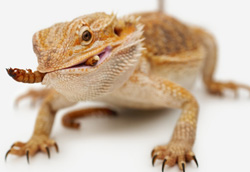Feeding your bearded dragon
Bearded dragons are omnivorous. They will eat both insects and vegetables. Adult dragons will also eat pinky mice, baby lizards and anything else they find tasty. They tend to do best on a varied diet based primarily of vegetables.
Greens & Vegetables
Bearded dragons will need there greens chopped up. The smaller the reptile the more finely chopped. A good mix of vegetables for these lizards are raw shredded carrots, collard greens, dandelion greens, mustard greens, kale, and frozen vegetables like carrots, peas, and beans. You should avoid spinach and broccoli because too much can be harmful. Bearded dragons also like green leaf and romaine lettuce but these should be used sparingly due to the limited nutrional value, and some fruits can be given to your bearded dragon like berries, apples, grapes, cantaloupe, papaya, mango, blueberries, bananas. The plant portion of the diet should be about 20-30% of the diet. Vegetables should be fed to your animal daily. All these foods are easily attained in the produce section of your local grocery store.
Insects
Common insects available for reptiles are crickets, mealworms, superworms, and wax worms. Bearded dragons will usually eat all types of insects. The insects should be gut loaded before feeding them to your pet lizard. Gut loading is just feeding them a nutritious meal before giving them to your bearded dragon. This way they pass along the nutrients to your lizard. There are many commercially available cricket and insect diets for gut loading. Insects should be a part of your bearded dragon’s diet every other day.
Water
Water should be provided in a shallow dish. This should be changed everyday and left on over on the cool side of the tank.
Dietary supplements
Your pet bearded dragon will need a calcium and vitamin D3 supplement. If your lizard is lacking D3 and calcium it can get metabolic bone disease which can be fatal. The supplement will come in a powder form which you can sprinkle on the vegetables or coat the insects. The easiest way to coat insects is to place them in a bag or cup and shake them around. You should add the supplement to your adult bearded dragon’s diet about once a week. Breeding females, babies, and juveniles will need them more often.
Bearded dragons are omnivorous. They will eat both insects and vegetables. Adult dragons will also eat pinky mice, baby lizards and anything else they find tasty. They tend to do best on a varied diet based primarily of vegetables.
Greens & Vegetables
Bearded dragons will need there greens chopped up. The smaller the reptile the more finely chopped. A good mix of vegetables for these lizards are raw shredded carrots, collard greens, dandelion greens, mustard greens, kale, and frozen vegetables like carrots, peas, and beans. You should avoid spinach and broccoli because too much can be harmful. Bearded dragons also like green leaf and romaine lettuce but these should be used sparingly due to the limited nutrional value, and some fruits can be given to your bearded dragon like berries, apples, grapes, cantaloupe, papaya, mango, blueberries, bananas. The plant portion of the diet should be about 20-30% of the diet. Vegetables should be fed to your animal daily. All these foods are easily attained in the produce section of your local grocery store.
Insects
Common insects available for reptiles are crickets, mealworms, superworms, and wax worms. Bearded dragons will usually eat all types of insects. The insects should be gut loaded before feeding them to your pet lizard. Gut loading is just feeding them a nutritious meal before giving them to your bearded dragon. This way they pass along the nutrients to your lizard. There are many commercially available cricket and insect diets for gut loading. Insects should be a part of your bearded dragon’s diet every other day.
Water
Water should be provided in a shallow dish. This should be changed everyday and left on over on the cool side of the tank.
Dietary supplements
Your pet bearded dragon will need a calcium and vitamin D3 supplement. If your lizard is lacking D3 and calcium it can get metabolic bone disease which can be fatal. The supplement will come in a powder form which you can sprinkle on the vegetables or coat the insects. The easiest way to coat insects is to place them in a bag or cup and shake them around. You should add the supplement to your adult bearded dragon’s diet about once a week. Breeding females, babies, and juveniles will need them more often.
This is a very good website that I myself used to use to obtain good quality food for my beardie, as I live in a rural area and no pet store in my area did the proper food for the wee tike! Hope you find it helpful! :)
Click below!!
LIVE FOOD DIRECT
Click below!!
LIVE FOOD DIRECT

